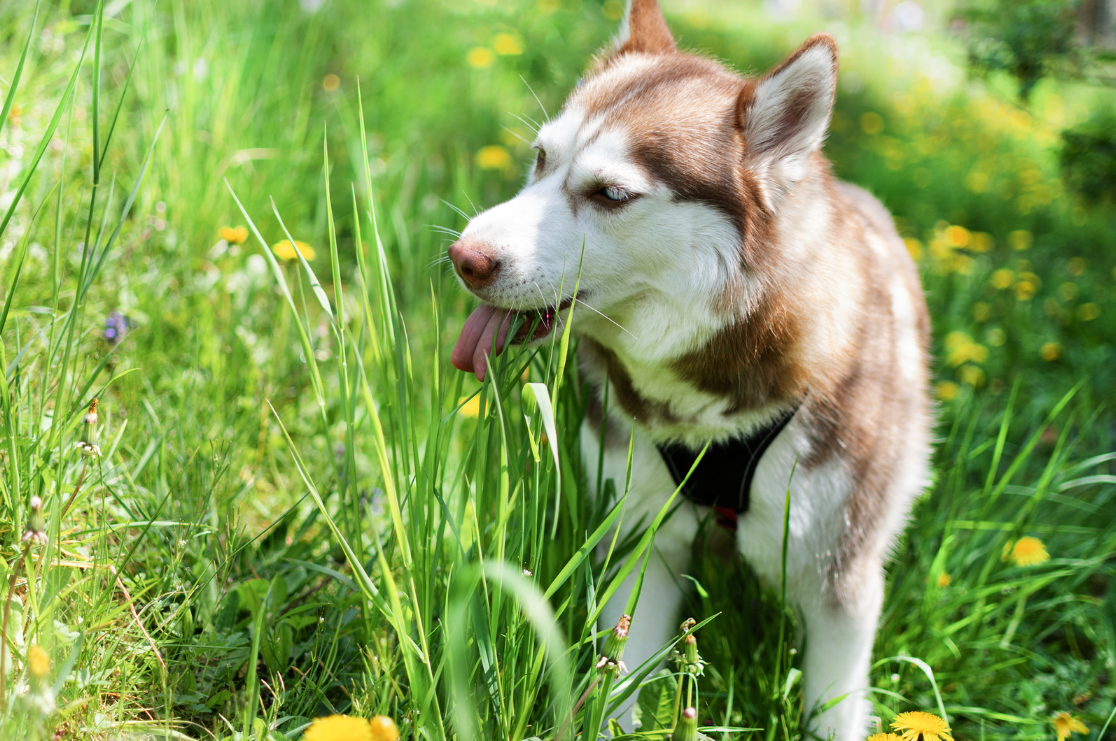Have you ever watched your dog munch on grass and wondered, "What's going on here?" This seemingly odd behavior is actually steeped in biology and instinct. In this article, we uncover the science, myths, and the practical implications of dogs eating grass. We’ll also answer the question: “Why do dogs eat grass?”

Why Do Dogs Eat Grass? The Science
Dogs eat grass because of their biology, instinct, and individual preferences. Let's dive into the scientific reasons that explain why dogs are drawn to this green snack.
Nutritional Reasons
Grass is rich in fiber and can be part of a dog's attempt to fulfill nutritional needs. A study conducted by the University of New England found that grass eating might be linked to a dog's innate need to improve digestion or fulfill some unmet nutritional requirement.
Providing a balanced diet with the necessary vitamins and minerals usually mitigates this behavior.
Instinctual Behavior
The instinct to eat grass also dates back to dogs' wild ancestors, who consumed plant matter as part of their diet. This instinctual behavior has been passed down through generations and is still present in modern dogs.
Grass Tastes Good
Some dogs are attracted to the taste and texture of grass. This preference might be linked to their natural curiosity and willingness to explore different tastes. It's a harmless habit unless it becomes excessive.
Boredom and Psychological Needs
Psychological factors like boredom or anxiety can lead a dog to eat grass. Engaging your dog in stimulating activities and providing mental enrichment can alleviate this behavior.
Is Eating Grass Harmful to Dogs?
While eating grass is generally considered normal, there are circumstances when it might be harmful. Understanding the potential risks and knowing when to be concerned is essential for responsible pet ownership.
Potential Risks
The primary risks associated with dogs eating grass include:
- Ingestion of Pesticides: Chemicals used on lawns can be harmful if ingested.
- Contaminated Grass: Parasites or harmful bacteria in the grass can pose health risks.
- Choking Hazard: In rare cases, grass might cause choking.
When to Be Concerned
If your dog's grass-eating behavior becomes excessive or is accompanied by other symptoms, it's time to consult a veterinarian. These could be signs of underlying health issues:
- Vomiting or Diarrhea: If these symptoms follow grass eating.
- Excessive Consumption: Eating large quantities of grass regularly.
- Behavioral Changes: Any sudden change in behavior (e.g., excessive whining) or eating habits.
Is It Okay to Let Your Dog Eat Grass?
Deciding whether to allow your dog to eat grass involves considering several factors, including the source of the grass and the dog's overall health. Here's a closer look at the considerations.
Guidelines and Safety
Consider the following when allowing your dog to eat grass:
- Source of Grass: Ensure that the grass is free from pesticides and chemicals.
- Quantity: Monitor the amount of grass consumed to prevent digestive issues.
- Overall Health: Consider your dog's overall health and dietary needs.
Tips to Prevent Dogs from Eating Grass
Here are a few strategies to prevent or minimize grass eating:
Understand the Underlying Cause
- Assess Diet: If the behavior is linked to nutritional needs, consider evaluating your dog's diet with a veterinarian to ensure it's balanced and fulfilling.
- Observe Behavior Patterns: Identifying triggers such as boredom or anxiety can help in addressing the root cause.
Provide Alternatives
- Offer Safe Plants and Vegetables: If your dog enjoys nibbling on plants, consider providing safe alternatives like wheatgrass and bell peppers.
- Engage in Play: Redirecting the behavior through play and mental stimulation can reduce the inclination to eat grass.
Training and Behavior Modification
- Positive Reinforcement: Reward your dog for leaving the grass alone and redirecting their attention to toys or treats.
- Consistent Training: Consistency is key in dog training. If you want to discourage grass eating, make sure all family members follow the same guidelines.
Monitor and Control the Environment
- Safe Outdoor Spaces: Make sure that the areas where your dog plays are free from harmful chemicals and pesticides.
- Supervised Outdoor Time: Keeping an eye on your dog during outdoor activities allows you to intervene if they start eating grass.
Consult a Professional if Needed
If the grass-eating behavior is persistent and concerning, consulting a behavioral specialist or veterinarian can provide personalized strategies based on your dog's specific needs and behavior.
FAQ About Dogs Eating Grass
Why Did My Dog Eat Grass and Then Throw It Up?
Eating grass might irritate a dog's stomach lining, leading to vomiting. It's essential to monitor them and ensure hydration, especially if this behavior is recurrent.
Is Eating Grass a Sign of Illness?
While grass-eating itself isn’t typically a sign of illness, if it's accompanied by other symptoms like lethargy or changes in appetite, it can indicate underlying health issues.
Do Dogs Like Grass?
Individual preferences vary, and some dogs enjoy the taste and texture of grass. Observing your dog's behavior and preferences helps in understanding this habit.
Conclusion
At Two Tails, we appreciate the multifaceted nature of dogs and strive to support pet owners in nurturing healthy and happy relationships with their furry friends. Whether it's through offering personalized pet products or providing insights into pet behavior, our commitment is to enhance the bond between you and your pet.
